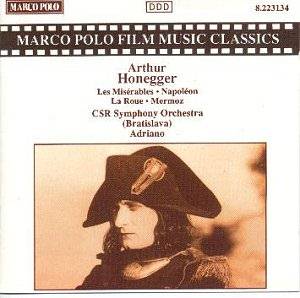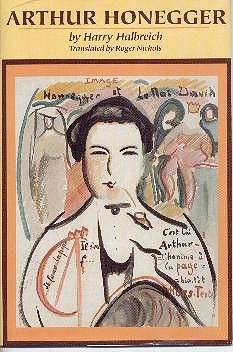Combined Book and CD Review
The CD

(note: this is not a new release; the recording was made in 1987)
This album has been in my collection for some time but it seemed appropriate
to review it now because we are carrying a review of a new book on the composer
and Music on the Web is also carrying reviews of more music by Honegger this
month.
Arthur Honegger (1892-1955), one of the greatest of twentieth century composers,
made a very significant contribution to film music during the course of some
30 years from his scores for Abel Gance's La Roue in 1922 and
Napoléon in 1926, to his last work in the genre in 1951. He
scored for a total of forty films. Honegger arranged some of his film music
for the concert hall. Probably his most famous work, Pacific 231 (the
name of a locomotive - he was passionately interested in railways, including
model railways) was originally composed as a concert piece but was later
used in a film about the train.
Les Misérables begins with the sombre
'Générique', intense and dramatic almost a funeral march but
it soon develops into a lighter veined and appealing pastoral accompaniment
for Jean Valjean on his travels. 'Dans les Égouts' (In the sewers)
is another dark expression of superhuman effort and is based on a continuous
rhythm of pairs of eighth-notes. 'Music chez Gillenormand', using an ensemble
of string octet and solo wind, recreates the chamber character of this
contrastingly cheerful rollicking piece. Clarinet and trumpet play a picturesque
duet in this charming interlude. 'La mort de Valjean' (The Death of Valjean)
is a lovely deeply-felt cue employing trumpet and saxophone in the melodic
line, with a continually modulating two chord ostinato figure passing from
piano to strings. The final L'émeute (The riot) is epic battle music.
La Roue (The Wheel) is something of a misassembly of scraps
of material from the music Honegger wrote for Abel Gance's film. As one might
deduce from the short piece's rhythmic patterns, the film is about railways
and the melodramatic material suggests dirty doings afoot(plate).
Much more significant and impressive is Honegger's splendid music for
Mermoz (1942). It is one of the best scores Honegger wrote
for the cinema. The film was about the French aviator Jean Mermoz. It is
interesting to compare this score with that of Franz Waxman's for Billy Wilder's
marvelous The Spirit of St Louis for there is a commonality between
the two screenplays. The suite is in two movements: La Traversée
des Andes (Crossing the Andes) and Le Vol sur l'Atlantique (The
Flight over the Atlantic). The music is vividly evocative. You can visualise
the swirling of the air around the aircraft and its progress through the
clouds over the Andes and the lightning flashes around the little plane as
it gropes its way through the storm over the Atalantic. This is imaginative
evocative writing at its very best. I would commend every student of film
music to listen to this work.
Honegger's Suite from Napoléon consists of very varied
material. The opening 'Calme' is an idyll in the style of the composer's
highly popular Pastorale d'été.
'La Romance de Violine' is romantic pastiche; a salon piece. 'Danse des Enfants'
is a buoyant folksong-like trifle in the manner of Messager. The tone changes
in 'Interlude and Finale' which starts out sounding darkly impressionistic
before revolutionary songs intrude. The 'Chaconne de L'Impératrice'
is more of a slow rather sultry waltz that nods towards Fauré or Messager.
'Napoléon' sounds appropriately imposing, indomitable and regal. Adriano
makes much more of 'Les Ombres' (The shadows) than Marius Constant on a rival
Erato Ultima CD. This is a mysterious and atmospheric piece for strings and
mid-distanced trumpet suggesting the call of duty before an approaching storm.
The final 'Les Mendiants de la Gloire' (The Beggars of Glory) brings the
suite and the album to a magnificent and glorious conclusion as Napoleon's
army marches off to Italy to La Marseillese in a peroration that rivals that
of Tchaikovsky's 1812.
Fabulous
Reviewer
Ian Lace
 This CD is also reviewed
by Didier C. Deutsch
This CD is also reviewed
by Didier C. Deutsch
The Book
ARTHUR HONEGGER By Harry Halbreich (Translated by Roger
Nichols)  Amadeus Press 680 pages
Amadeus Press 680 pages
£32:50 (Amazon UK £24.54)
USA $44:95 (Amazon US $31.47)
|
 |
Save around 22%
with
Amazon
UK
Amazon US
|

This important book traces the life of this great twentieth century composer
and analyses all his many works written in every genre. Every one of his
43 film scores is discussed in detail together with his many works for the
theatre and radio plus his light music as well as his more "serious works".
A much more detailed
review
of this book appears on our companion site Classical Music on the Web
Reviewer
Ian Lace

